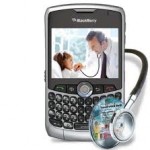 The use and application of mobile devices in healthcare is certainly one of the more exciting technological developments of recent times. Experts such as Eric Topol are predicting an age where our mobile devices are increasingly used to record and communicate our health data with professionals, who can then act accordingly on the data we send them.
The use and application of mobile devices in healthcare is certainly one of the more exciting technological developments of recent times. Experts such as Eric Topol are predicting an age where our mobile devices are increasingly used to record and communicate our health data with professionals, who can then act accordingly on the data we send them.
These kind of predictions are seeing fruition through projects such as the Qualcomm Tricorder competition, which launched last year. The $10 million prize asks competitors to accurately diagnose 15 diseases in 30 patients across 3 days using nothing but a mobile device.
There have been several studies recently highlighting how effective such devices could be in improving our health. One for instance, that was led by the Center for Connected Health, found that people using their mobile device to manage their health did a better job at lowering their blood pressure and blood sugar levels.
A second study looked at the amount of data that can be collected by a mobile device, and it’s value to both patients and doctors alike.
“When linked to the rest of the available electronic data, patient-generated health data completes the big data picture of real people’s needs, life beyond the health care system,” said Amy Abernethy, a Duke University professor of medicine lead author of the study.
This capability is only likely to improve as new technologies come onto the market. For instance, Michigan Technical University recently developed a prototype device that was a mobile laboratory that was the size of a credit card.
Traditionally, when you get sick, your doctor may take a sample of your blood and send it off to a lab for testing. That can often take some time to return results, which is both expensive and inefficient. The new device promises to change all of that.
The device provides a mobile laboratory that is the size of a credit card, and can offer people the opportunity to conduct blood tests wherever they may be. Such a facility would provide results to users within minutes, thus making it more cost effective as well as more efficient. It can also be used remotely.
The numerous quantified self style applications in the fitness world have shown what can be achieved when people become engaged in their health and wellbeing. It seems inevitable that this market will gradually expand to take in an ever growing range of health related issues, with the likes of the NHS pilot scheme getting patients to monitor and record blood sugar levels merely the start.